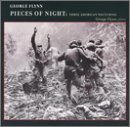The tragic never receeds in music as well
scarecrow | Chicago, Illinois United States | 09/22/2003
(5 out of 5 stars)
"The tragic, the penumbral seems to be an eternal icon in art not any less within the dimensions of serious music.It had served Adorno quite well in his powerful observations into the language of modern music, as well as discovering philosophic/social insights into Mahler, Beethoven, and Wagner. Adorno's reading of Hegel very closely,as the Master and Slave moments in the Phenomenology of the Spirit referrring to the tragic, the dark as the negative of the negative, the critique of all that exists.If one reads the fascinating accounts of Guardian journalist Robert Fisk, where his reportage of the Iraq War & Occupation seems to occur always by night, visiting the morgues of Baghdad to get a real count. Although Flynn perhaps had the transgressions, and moral degradations of Vietnam in mind, this CD certainly summons the resonant darknesses and unknown dangers and opaqueness of Post 9/11 Times. It reveals perhaps how things never change, that there will always be "The Enemy" however one wishes to define it,defining "them" and "Other" along somewhat racist lines.With the paradigm of Soviet Russia in recession it has now been replaced within the "unknowns", merely forever continuing unknowns like Lacan's "objet petit a", something that is never quite explained,(the Post 9/11 sympthoms) (the dangers) yet somehow they must neurotically exist to help promuligate a foreign policy for Washington."Pieces of Night" has a controlled violence after-the-fact of course,this anxiety, Flynn constructs a sense of the "dead end" the claustrophobic,linear tight impactedness of the musical moment,the chord, G# B D A,or D A B C# D# that gets tossed and permuted, turned within the virtuosic welter of finely honed pianistic timbre;Contracted into fistfulls of rolled chords and accreted as the emotional power allows here.These moments lead overwhelmingly to nothing,structurally at times you sense perhaps traditional development, but that's far too academic. Flynn's music succeeds much of the time by ignoring the predictable bookish set theory dimensions academia has been know for;That each moment needs requires incessant explanation. The musical language here is far freer,combustable like a dialogue unencumbered, yet you sense the full weight of timbral history of Ives, of Messiaen, of Boulez, of Cage, the language of violent cluster tremoli,resonant arpeggiated pianistic moments, of directly exclaimed atonal chords,and percussive low register drum like bangs, as punctuations for upper register strident moments.All this however is well proportioned and shaped,directed upwards and downwards. No moments take off uncontrollably toward an opaque unknown, toward a timbral abyss. Flynn's music needs a strong narrative, even if it is undefined at first. His music responds well then for the listener once the listener committs him/herself to the powerful moments of Flynn's piano oeuvre. There are three Nocturnes here interrupted by what Flynn calls, from the medical term for the twitching of the eyebrows of the human head prior to sleep, or during nightmares "Myoclonus", each relatively short, the first a mere 1:14 and the second 4:52. These are interruptions using at times repetitive cluster chords to halt the flow of time. The three Nocturnes then function much like structural pillars lumbering toward resolution of the last one, "Tumult and Lullaby"."


 Track Listings (22) - Disc #1
Track Listings (22) - Disc #1